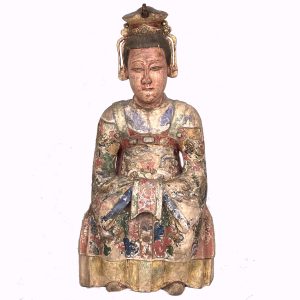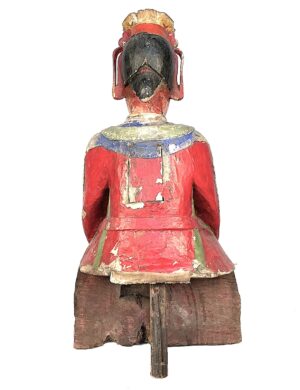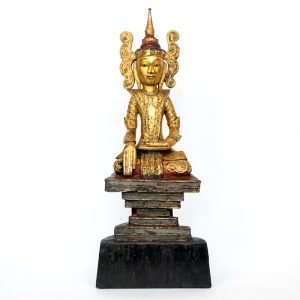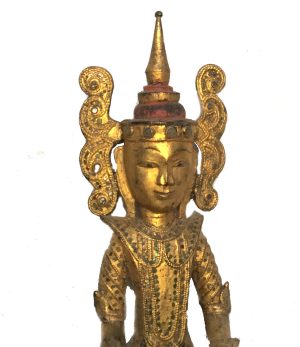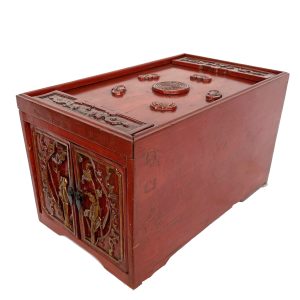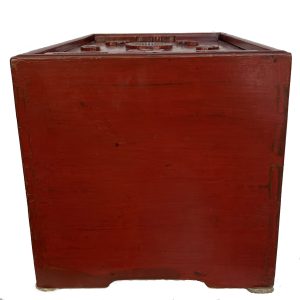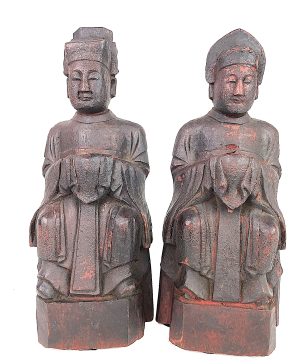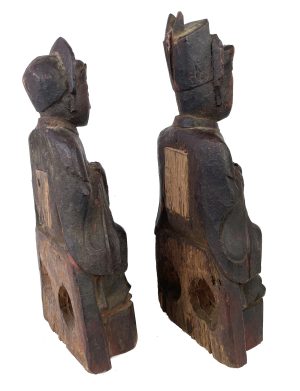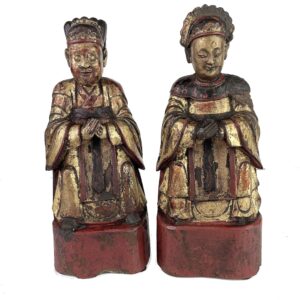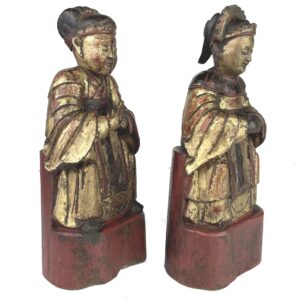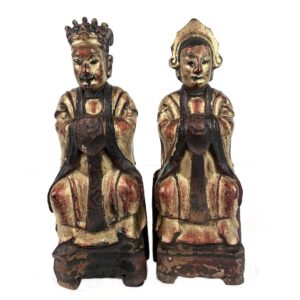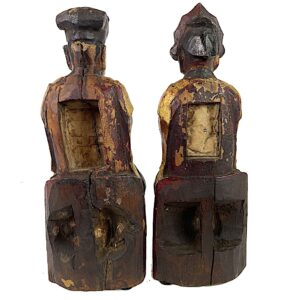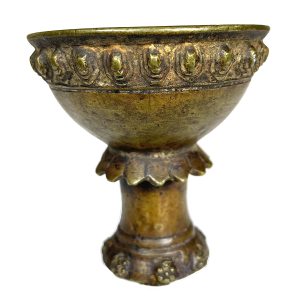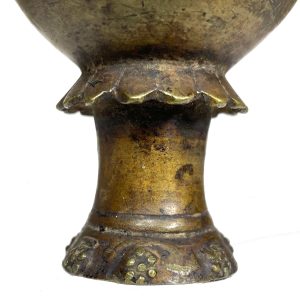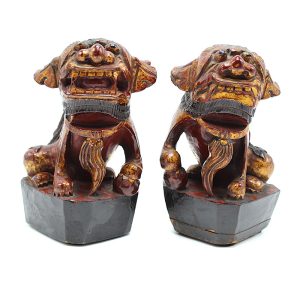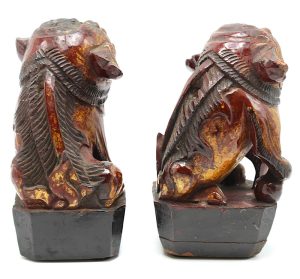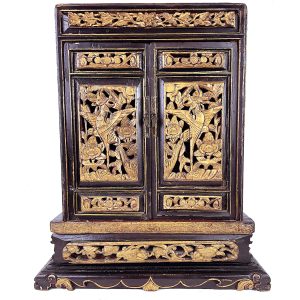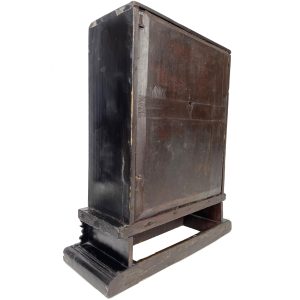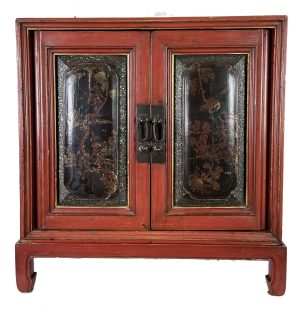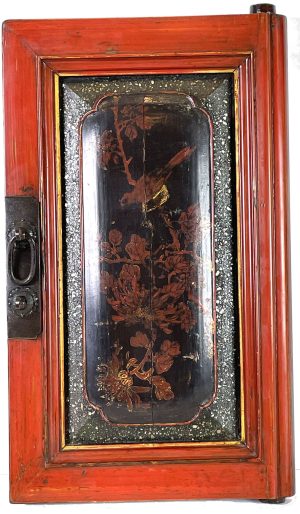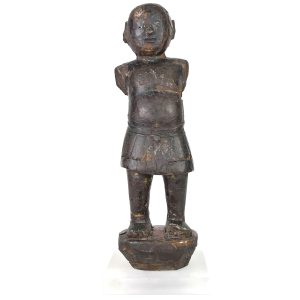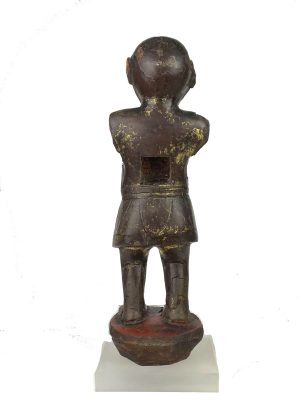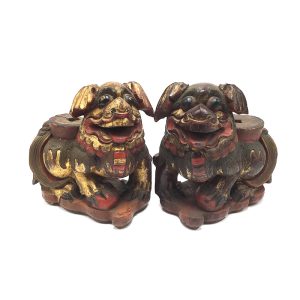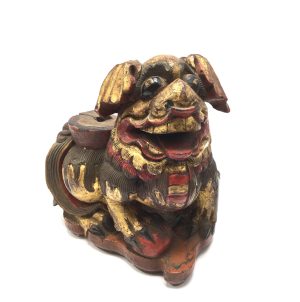Showing 85–96 of 313 results
-


$3,250.00
Mazu has many names and titles. In China she is Mazu (Matsu) meaning ‘Ancestor Mother’ or ‘Eternal Mother’ and on southern China she is affectionately called ‘Ā-mā’ meaning ‘grandmother’ or ‘mother.’ In Taiwan she is ‘Holy Heavenly Mother’ and the ‘Empress of the Heavens’ and ‘Tianhou,’ Daughter of the Dragon. She is the most worshiped female Taoist…
-


$2,575.00
H: 25.5” W: 9.75” D: 5” | CALL 213-568-3030 FOR SHIPPING quote or email [email protected]
This elegant Jambupati Buddha is seated in lavish gilt court attire in Earth Witnessing mudra, one hand in his lap and one reaching over to touch the earth. Dazzling gilt covers his body, elaborate crown with butterfly flanges and his kingly garment that is “bejeweled” with multi- colored cut glass inset pieces. His multi-tiered throne emphasizes his royal status. He looks directly at onlookers with confidence and a slight smile to emphasize his spiritual and material power.
-
Sale!


$385.00 Original price was: $385.00.$325.00Current price is: $325.00.
Ht: 8.5” W: 15” D: 9” | CALL 213-568-3030 OR EMAIL [email protected] FOR SHIPPING COST
Given the auspicious images on this finely crafted red and gilt jewelry box, it was probably a wedding gift for a fortunate couple as a wish for fertility, harmony and many and sons. The doors have a carved lotus symbolizing beauty and purity and the top has 5 bats surrounding a longevity roundel. When depicted on a box, it means as “May you have a harmonious marriage with the Five Blessings” (longevity, health, wealth, virtue and a peaceful death) and signifies completeness, togetherness and harmony.
-
Sale!


$695.00 Original price was: $695.00.$450.00Current price is: $450.00.
H: 7.25 ” W: 3 ” D: 1.625 ” | FREE SHIPPING WITHIN CONTINENTAL U.S.!
This fine pair of the Kitchen God and his wife are mirror-images of each other seated on backless chairs with multi-sided pedestals and reflect the reverence and solemnity of their responsibility to live above the stove and protect the home. The original lacquer has darkened naturally over time and from exposure to candle and incense smoke leaving a soft patina. The cavity on the male has its original covering while the one on the female is missing, exposing contents inside – a string tied around the script placed by a monk when it was consecrated. Kitchen Gods radiate warmth, especially when placed near the stove and make unique house warming or wedding gifts and add positive chi to any household.
-


$785.00
H: 7.75″ W: 3.25″ D: 2.375″ | free shipping within Continental U.S.!
Finely detailed and carved from dense wood, this Kitchen God and his Wife monitor the members of the home from their perch above the stove. On Chinese New Year Zao Shen reports to the Jade Emperor in Heaven and a positive report bringsblessings and good fortune, while and unfavorable one brings misfortune. Family members often smear honey on his mouth to sweeten the report. Near mirror images they wear layered gold officials’ robes with decorative sashes and symbolically hold a hu tablet. They are in excellent condition and add positive chi and enhance feng shui. Kitchen Gods especially pairs are now rare and very collectible and make unique wedding and house gifts.
-
Sale!


$695.00 Original price was: $695.00.$475.00Current price is: $475.00.
H: 7.75 ” W: 2.875 ” D: 1.875 ” | FREE SHIPPING WITHIN CONTINENTAL U.S.!
This husband and wife Kitchen Gods are near mirror images with similar layered gold officials’ robes clasped hands covered in ritual cloth. They portray house gods whose future of families are in their hands. They are in excellent condition with fine patinas and both have been consecrated with the consecration script remaining in the wife’s cavity but not in the male’s cavity.
-


$295.00
A kumkum container is as part of Hindu puja used for Hindu social and religious markings. Kumkum is dried and made into a paste combined with small amounts of slaked lime sometimes embellished with a few grains of rice that turns the turmeric reddish and is used to apply a tikka – a small dot…
-


$395.00
H: 5.75″ W: 3.25″ D: 2.75″ | FREE SHIPPING WITHIN CONTINENTAL U.S.!
Each of this whimsical gold and red-burgundy lacquered pair of male fu lions sits erect on a high pedestal heads thrown back with flaring ears, bulging eyes, decorative stylized manes and a small bushy tail. Their spirituality is displayed by the pair silently emitting the blessed mantra “aum”: the open mouthed lion forming an “au,” and the other completing it with a closed mouth to form “mmm.” The workmanship on these pieces is masterful, although rustic and provincial, and they are rare with their Buddhist symbolism and because most pairs of fu lions pairs were lost during China’s modernization.
-
Sale!


$595.00 Original price was: $595.00.$425.00Current price is: $425.00.
H: 16.375″ W: 13.625″ D: 5.75″ | FOR SHIPPING INFORMATION CONTACT US AT 213-568-3030 or [email protected]
This intricately carved black and heavily gilt antique cabinet is a fine example of a Straits Chinese furniture made in Guangdong for the Southeast Asia market. Carved openwork panels with phoenixes and lotuses are symbolic wishes for harmony, blessings, rank, good fortune; outstretched wings wish for harmonious marriage, many sons and the inside decoration a wish for status and successful career. Although flamboyant for todays taste, it is a unique accent piece and gift for newly weds.
-
Sale!


$450.00 Original price was: $450.00.$325.00Current price is: $325.00.
H: 22 ” W: 21.5 ” D: .12.25 ” | FREE SHIPPING WITHIN CONTINENTAL U.S.!
This small elm cabinet is from Fujian province known highly decorative vernacular for the new wealthy merchant class. Vernacular furniture was often red lacquer with auspicious symbols. The left door has a magpie on plum tree branch and the right a magpie with a chrysanthemum. The magpie is the bird of joy and happiness and the magpie and chrysanthemum mean “May the whole family be happy,” The a plum symbolizes longevity) and when they have 5 leaves are a wish for the Five Joys/Happinesses: health, wealth, longevity, a life of virtue and a peaceful death. These cabinets were perfect gifts for newlyweds as a desire for double happiness, a long and fruitful marriage with sons
-
Sale!


$985.00 Original price was: $985.00.$650.00Current price is: $650.00.
H: 17.5 W: 6” D: 5” | FOR SHIPPING INFORMATION Call 213-568-3030 or email [email protected]
Given that this image of the infant Buddha is missing both arms it is remarkable that it is remains a powerful yet charming sculpture. Created by a skilled rural artisan from one dense piece of wood, this rare statue of the the young Buddha is a humble child in a relaxed and confident stance with a youthful torso, a round head, bent legs, wearing a modest waist-cloth and standing on a small plain round base.
-


$595.00
Whimsical carvings of fu lions were the most popular mythical animals in Chinese homes, especially during the Ming and Qing dynasties, as free standing statues, designs on furniture, architectural elements and functional pieces in private homes or gardens or on a home altar to bring fu and the blessings to the home. This incredibly cute…
End of content
End of content

